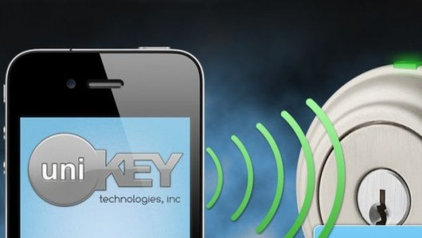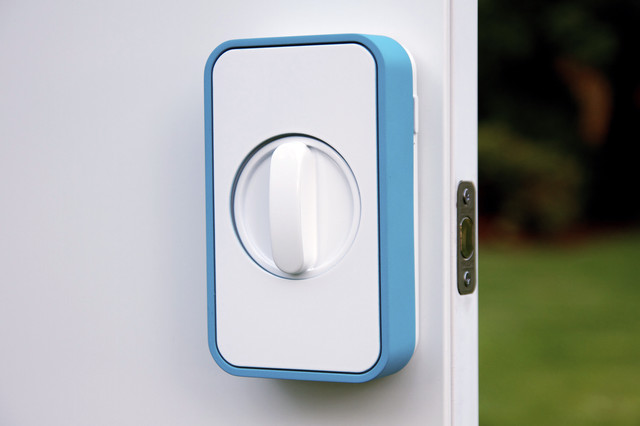Here's a cool article from written by Mike Elgan of Houzz.com. The future is slowly creeping into our houses. I can't wait until there is an app to have my kitchen make me a banana split.
Smart Phones Hold the Keys to Front Doors
Knock, knock. Who's there? A brand-new generation of hardware and app combos that let you play doorman from anywhere
The smart phone has become the mother of all electronic devices for one very simple reason: You always have it with you. And that's why a phone is a great place to put all the stuff related to your door. For example, you can virtualize the key, the peephole, the doorbell and other elements of the door, and put everything on your phone to be used from anywhere over the Internet.
There are major advantages for doing this (besides laziness). For example, you can send a key via email to unlock your door. You can hear knocks on the door or the ringing of the doorbell even when you're not at home. And you can see who's there even when you're not.
Three new products take electronic door stuff to the next level. All of them are crowd-funded projects still in development. But if everything goes according to plan, you'll be able to buy all of them, and at an affordable cost, by summer 2013.
There are major advantages for doing this (besides laziness). For example, you can send a key via email to unlock your door. You can hear knocks on the door or the ringing of the doorbell even when you're not at home. And you can see who's there even when you're not.
Three new products take electronic door stuff to the next level. All of them are crowd-funded projects still in development. But if everything goes according to plan, you'll be able to buy all of them, and at an affordable cost, by summer 2013.

Some phone-based door products enable you to use your phone much as you would a key. You walk up to the door, pull out your phone instead of your key, then unlock the door with your phone.
One offering in this category is the UniKey, which uses Bluetooth wireless technology to unlock the door. You just touch the UniKey deadbolt, and it unlocks if your phone is within a few feet of the lock. (Anyone can lock the door without a phone.)
But the UniKey system also does another neat trick. From the UniKey app, you can send an electronic copy of the "key" — for example, if you want to let a friend into your house while you're away, you can send the key over the Internet, then the friend can use it to unlock your door. You can also revoke keys using the app and send keys that work only during certain hours of the day.
Pricing hasn't been announced for the UniKey, but the company says it will be less than $199.
One offering in this category is the UniKey, which uses Bluetooth wireless technology to unlock the door. You just touch the UniKey deadbolt, and it unlocks if your phone is within a few feet of the lock. (Anyone can lock the door without a phone.)
But the UniKey system also does another neat trick. From the UniKey app, you can send an electronic copy of the "key" — for example, if you want to let a friend into your house while you're away, you can send the key over the Internet, then the friend can use it to unlock your door. You can also revoke keys using the app and send keys that work only during certain hours of the day.
Pricing hasn't been announced for the UniKey, but the company says it will be less than $199.
 |
|
A company called Agipy is working on a very convenient smart phone lock called Lockitron. Rather than being a replacement deadbolt, the Lockitron fits over your existing deadbolt and turns it phyiscally when you send the command from your phone. The box runs on AA batteries, and the smart phone app will tell you when they need replacing. You can also turn the lock by hand.
Lockitron connects through your home's Wi-Fi network, which means you can unlock the door from anywhere in the world over the Internet. And the Lockitron does a few more neat tricks. It can sense you approaching by detecting the Bluetooth signal from your phone as you approach the door, and will unlock the door automatically. It also has a knock sensor; when someone knocks on the door, you get a message. You can also grant access to others by sending them permission over email. Lockitron was actually rejected by the crowd-funding site Kickstarter, so the developers did their own crowd-funding effort and raised a small fortune. They expect deliveries of the product by summer 2013. |
 |
|
Another crowd-sourced phone-controlled door project is called DoorBot.
The DoorBot, made by a company called Edison Junior, installs next to your door with four screws. It has a doorbell and a camera, and runs on AA batteries that last a year, according to the company. The camera is infrared capable, so you can even see who's at the door at night. The way it works is that when visitors ring the doorbell, your phone alerts you and you can see who's there, even when you're not at home. And you can speak to them through your phone. Perhaps best of all, the DoorBot is designed to work with the Lockitron, so not only can you see and speak with whoever's at your door, but you can let the person in, too. |



No comments:
Post a Comment